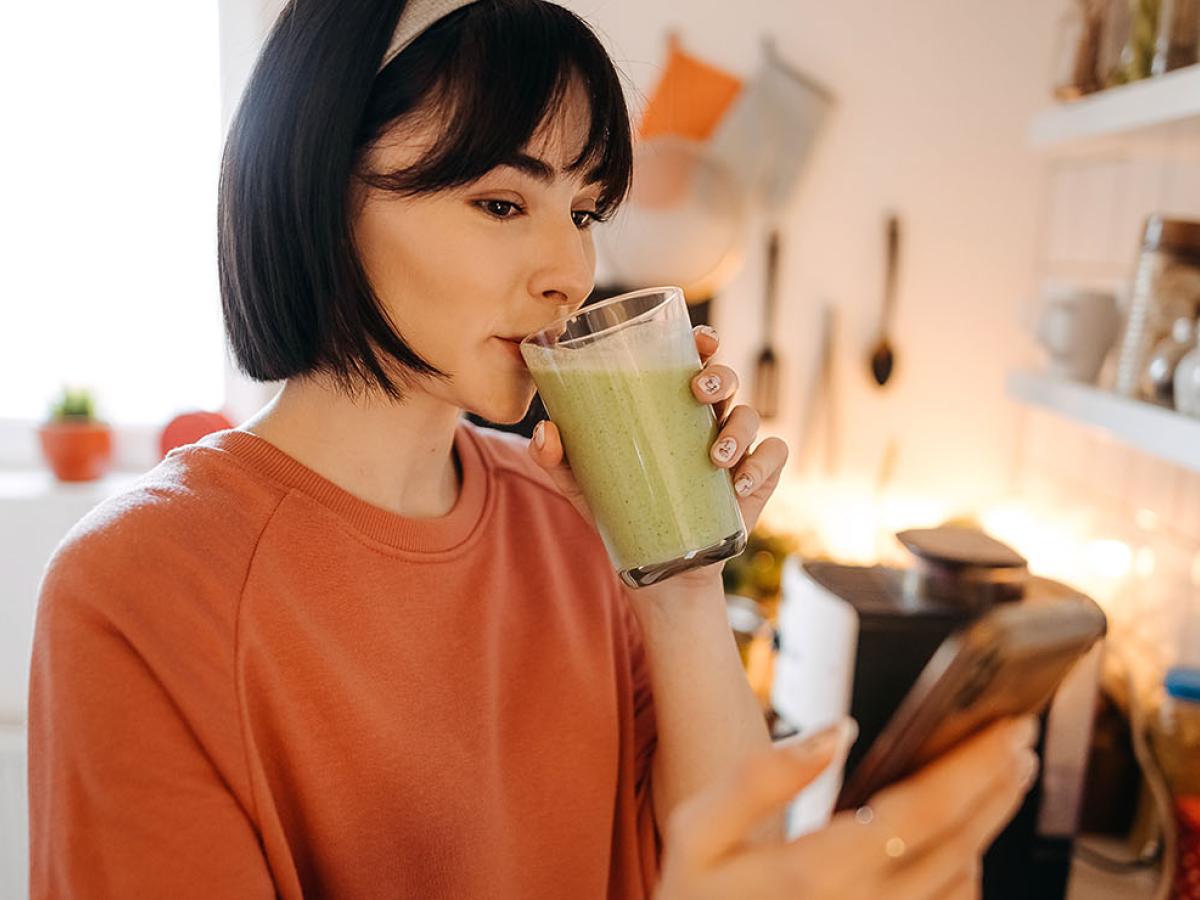June 19, 2023

Going green is always good, and plant-based diets have significant health benefits. But in the American spirit of doing everything “faster and easier,” people are turning to green powder supplements to get more fruit and vegetables into their diet.
These supplements are a mixture of dried and ground fruits and vegetables, such as leafy greens and grasses. The powder mixes into any beverage to provide greens in a glass. Sounds like a great alternative to fresh produce. But is it really?
We talked to MU Health Care dietitian Ginger Meyer to gain some insight.
“People are always looking for ways to add nutrients besides eating fruits and vegetables,” she says. “There are real fruits and vegetables in greens powders. But when you dry the vegetables and fruits and grind them to a powder, you lose some fiber and other nutritional content. What’s packaged with greens powders does not equal what you would get from eating whole fruits and vegetables.”
But that doesn’t mean that greens powders don’t have benefits for some people. Here’s what Meyer says you need to know:
Who Might Benefit From Using Green Supplements?
Greens powders should never take the place of healthy eating. But they do provide some of the vitamins and minerals you need daily. Some brands and blends also include additional, potentially healthy ingredients, including pre- and probiotics, protein and digestive enzymes (to help break down food).
Green supplements may be a good addition to the diets of:
- Athletes who already eat a balanced diet and want to add more vitamins and minerals
- People already using protein or probiotics who see the added nutrients as a bonus
- People who struggle to eat fruits or vegetables and need the nutrients that greens powders provide
- Travelers who may not have access to fresh produce
“Greens powders are specially marketed to athletes. They often need increased vitamins and minerals because of their high energy expenditure,” Meyer says. “They're looking for ways to get more nutrients, and greens powders may offer that.”
What to Consider Before Taking Greens Powder Supplements
There’s no research saying that greens powders are harmful to healthy people. But there are some things to consider before taking greens supplements.
Meyers recommends you:
1. Make Sure It’s Third-Party Tested
The U.S. Food and Drug Administration (FDA) does not regulate greens powders (or any other natural supplements). That means that no one checks to ensure that the ingredients on the label match what’s in the product.
“You might find trace amounts of lead, other heavy metals or other contaminants in supplements because they're not regulated,” Meyer says. “When you’re buying greens powders or any supplements, look for third-party tested products to ensure that it’s generally safe.”
Third-party testing ensures that a non-affiliated organization tests the product, finds that it contains what it claims and has no contaminants.
Keep in mind that third-party tested products may be more expensive. The brand pays these companies to compare what's on the label to what’s in the container. But often, the extra cost is worth the safety precaution.
2. Be Cautious of Claims
Between social media and clever marketing, it’s easy to believe that supplements can do what they claim.
Even if the company says its claims are backed by research, the research might not include large enough studies or testing on humans. And third-party testing doesn’t prove a product’s effectiveness.
“Without FDA regulation, the claims a company makes about their product are not necessarily validated,” Meyer says. “In the case of greens powders, there is a lack of high quality, peer-reviewed research. There’s no clear evidence that taking these supplements benefits your health.”
3. Study ALL the Ingredients
Reading the list of ingredients on any product you consume is a good rule of thumb. But checking out the label on greens powders is especially important if you have allergies, food sensitivities or dietary restrictions.
“If you have allergies or tend to be more sensitive, just be cautious,” Meyer says. “Many greens powders include grasses and grains that contain many different allergens.”
There’s no set recipe for greens powders — the ingredients can vary. Some powders can have 25 or more ingredients, including artificial ingredients and added sugar, to enhance the flavor or color. Others include proprietary blends (unique ingredient combinations). The label tells you what’s in the proprietary blend but not the ingredient amounts.
4. Discuss the Impact on Health Conditions With Your Doctor
Before you start taking supplements or over-the-counter medications, consult your doctor. They know your medical history and understand your current health.
“While greens powders do not pose any proven health threats, they can alter the nutrients you get,” Meyer says. The added nutrients can affect certain chronic health conditions, such as kidney disease, that require a restricted diet. Your doctor can tell you how a new supplement or medicine may affect your diet and, therefore, your condition.
5. Consider All Medications and Supplements You Take
Meyer recommends always looking at the big picture when adding a supplement or medication to your daily regimen. Greens powders are a perfect example of why it’s important.
Greens powders often contain a high amount of vitamin K — a nutrient in leafy green vegetables. People taking certain medications, such as blood thinners and cholesterol-lowering medication, must consume consistent vitamin K to avoid a potentially dangerous drug interaction. Adding greens powders to their diet (without factoring in the influx of vitamin K) may interfere with that consistency.
6. Factor in Cost
Greens powders can be pricey, especially when using a high-quality, third-party-tested product. They average $1.50 to $3.50 per day (or serving). Over time, consistent use can get costly.
“A better option for added nutrients might be a multivitamin,” says Meyer. “They can cost as little as three cents a day.”
The best option in terms of bang for your buck will always be whole vegetables. To keep the cost down, opt for frozen, which generally offer the same nutrients as fresh versions of the same vegetable.
7. Avoid Supplements if Pregnant or Breastfeeding
Human testing for supplements like greens powders is limited. Testing on women who are pregnant or breastfeeding is almost nonexistent.
“We don’t have conclusive evidence about how greens powders, or most supplements, might affect pregnancy or breastfeeding,” Meyer says. “Using supplements is not recommended for this population because we want to keep people safe.”
The Final Verdict on Greens Powders
Greens powders do have some nutritional merit. But Meyer says in a head-to-head matchup — if whole fruits and vegetables aren’t an option — she will take a multivitamin over greens supplements.
“From the greens powders I’ve looked at, the vitamins and minerals provided don’t offer the recommended daily intake I can get from a multivitamin,” Meyer says. “But ultimately, you must look at the big picture for every individual. If you’re benefitting from the nutrients, vitamins or probiotics in greens supplements, and your doctor feels they are safe for you, that’s a good thing.”
Next Steps and Useful Resources
Want to speak with dietitian? Find one today
- Learn why healthy eating doesn’t have to be boring.


